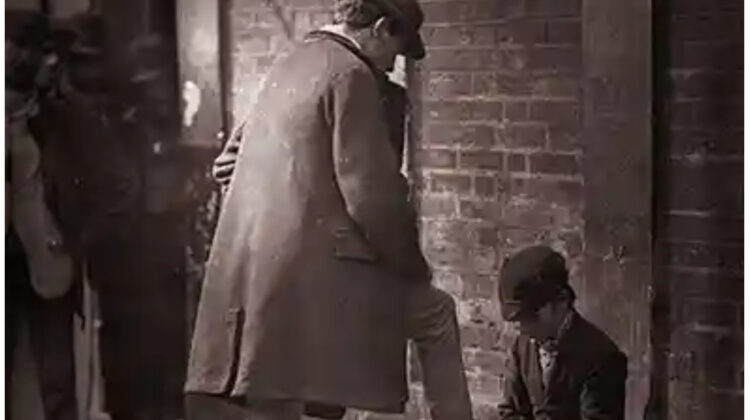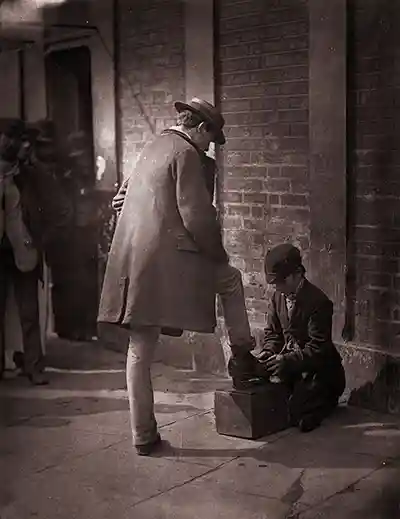

In Victorian London, shoeshiners, also known as boot polishers, shoeblacks, or bootblacks, were often young boys trying to make a living in poverty-stricken city. Some shoeshiners worked in brigades, whereas others were independent.
The brigades :
“These are the orthodox or legitimate boot-blacks, and they consequently find favour in the eyes of the police. The policeman, who is essentially a lover of order, an admirer of discipline, cannot understand why, if a boy wants to manipulate brush and blacking for a living, he should not join one of the brigades. He is likely to forget that the real attraction of street life, the one advantage it offers in exchange for all the hardships and poverty to be endured, is precisely that sense of independence and absence from discipline which no member of the brigade can enjoy. The shoe-black brigades, though excellent institutions, have decidedly trespassed on the freedom of street industries. Their organized and disciplined boys have the monopoly of various “beats” and “pitches” given them, and their exclusive right to clean boots in the streets or at the corners in question is rigorously enforced by the police.”
The independent boot-black, whose photograph is before the reader, found by experience that the system instituted was not altogether pleasant. He has served in two brigades, the “blues” and the “reds,” and found them both equally objectionable; so, at last, he gave up the uniform, and became an independent boot-black. In this capacity, though free, he experienced all the persecutions to which I have alluded, and as he grew older and more tired of this life, he finally resolved to leave the narrow streets for the broader thoroughfares of the ocean. As a sailor, he promises to become a useful help to his captain and ship. His mother has to nurse an invalid husband, and must also provide for a large family. Under these circumstances, it was not always easy for her to spare the services of her son. But when he became an independent boot-black, he could go out at his own hours, and thus was of greater use to his mother in her trouble; and it was a great help to the family to know that whenever the boy had a few moments to spare, he might run out and hope to gain some pence by cleaning gentlemen’s boots.”
Both extracts from Street Life in London, by John Thomson and Adolphe Smith, 1877.
Independent shoeshiners had to obtain a yearly licence:
“An independent boot-black who has not secured a licence – for which, by the way, he must pay five shillings a year when, if ever, he does obtain it – is severely handled by the police. They will not allow him to stand in one place. If he deposits his box on the pavement, the policeman will kick it out in the street, among the carriages, where it will probably be broken, and the blacking spilt. The independent boot-black must be always on the move, carrying his box on his shoulders, and only putting it down when he has secured a customer. Even then, I have known cases of policemen who have interfered, and one actually kicked the box away from a gentleman’s foot, while he was in the act of having his boots cleaned. This excess of authority was, I believe, illegal; and, I am glad to say, justly resented by the gentleman in question, who insisted that the independent boot-black should continue his work, and defied the police to arrest him. The policeman had evidently exceeded his orders, and this was proved by the fact that he did not dare accept the gentleman’s challenge. Of course, if the shoe-black, though not belonging to a brigade, possesses a licence, he may do as he chooses, and need fear no interference, but the difficulty is to procure a licence. The police do not, I believe, absolutely refuse to give a licence to an able-bodied man, but they contrive to keep him waiting so long, probably twelve months, that he generally gives up the attempt, and turns his attention to some other sort of work, or else goes out with brush and blacking, but without the licence, and submits to the ill-treatment that results.

Leave a Reply